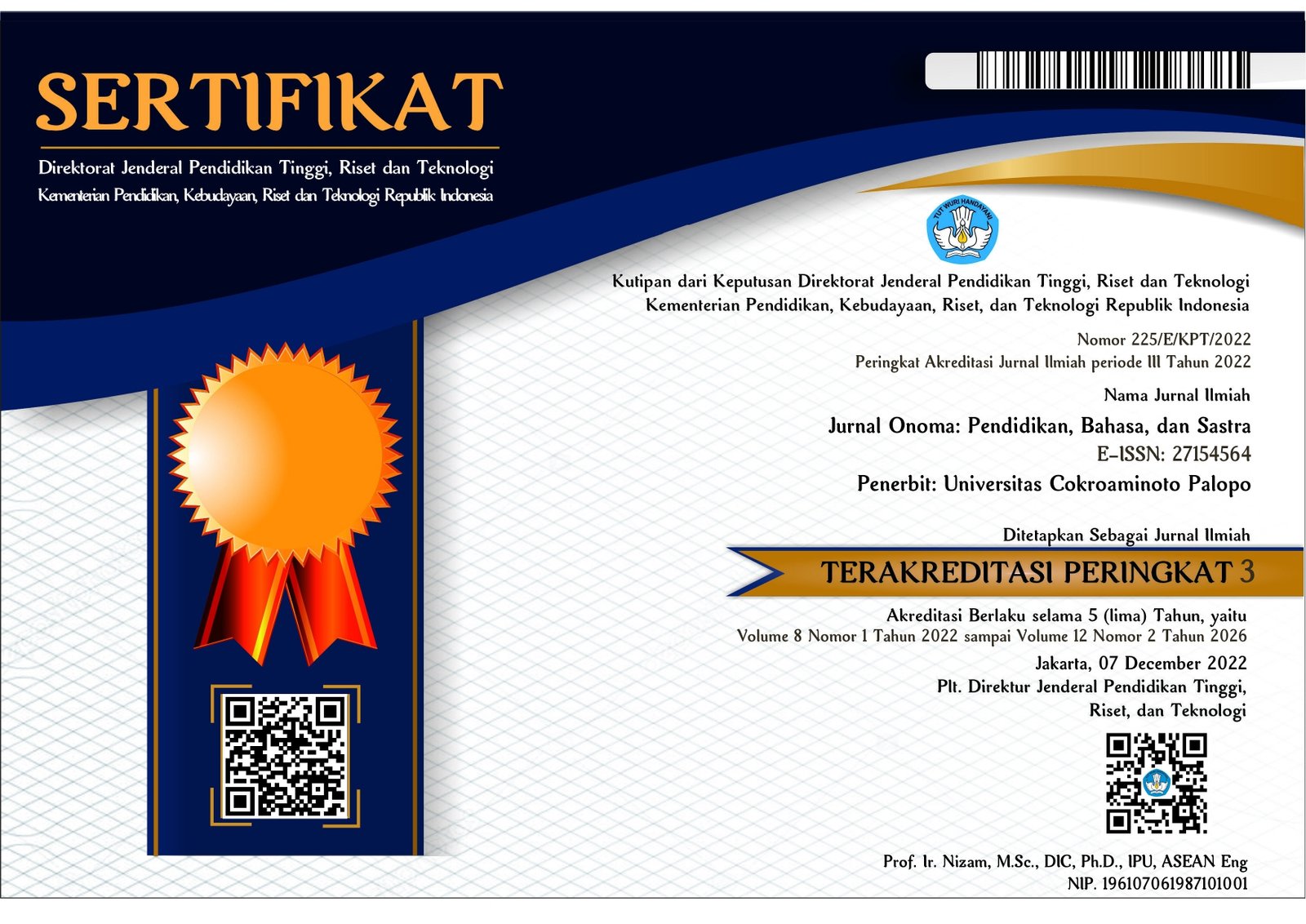Pengembangan Aplikasi LITERA Berbasis Kodular untuk Pembelajaran Sastra Berorientasi Literasi Kritis
https://doi.org/10.30605/onoma.v11i4.6797
Keywords:
literasi kritis, aplikasi pembelajaran, kurikulum merdekaAbstract
Penelitian ini bertujuan mengembangkan dan menguji aplikasi LITERA berbasis Kodular sebagai media pembelajaran sastra di SMA dengan pendekatan literasi kritis Paul & Elder. Perkembangan teknologi informasi dan komunikasi (TIK) mendorong inovasi dalam pembelajaran, khususnya dalam pengembangan media pembelajaran sastra yang berorientasi literasi kritis. Metode penelitian menggunakan model ADDIE dengan subjek guru dan siswa kelas XI SMA Negeri 2 Kintap. Validasi ahli menunjukkan kelayakan aplikasi dari aspek media (skor 4,78) dan materi (skor 4,85). Uji coba melibatkan 32 siswa menunjukkan tingkat penerimaan tinggi (respon positif >88%) dan peningkatan signifikan keterampilan literasi kritis, dengan rata-rata kenaikan skor 16,2 poin (p = 0,000). Temuan ini memperkuat relevansi integrasi literasi kritis dalam media pembelajaran digital berbasis platform no-code dan mendukung strategi pembelajaran berdiferensiasi sesuai Kurikulum Merdeka. Penelitian ini memberikan kontribusi praktis dan teoretis dalam pengembangan media pembelajaran inovatif yang kontekstual dan mudah diakses, sekaligus membuka ruang untuk penelitian lebih lanjut dalam skala yang lebih luas.
Downloads
References
Black, P., & Wiliam, D. (2009). Developing the theory of formative assessment. Educational Assessment, Evaluation and Accountability, 21(1), 5–31. https://doi.org/10.1007/s11092-008-9068-5
Branch, R. M. (2009). Instructional design: The ADDIE approach (Vol. 722). Springer Science & Business Media.
Facione, P. A. (2011). Critical thinking: What it is and why it counts (2011 update). Insight Assessment. https://www.insightassessment.com/wp-content/uploads/ia/pdf/whatwhy.pdf
Freire, P. (1970). Pedagogy of the oppressed. Herder and Herder.
Freire, P. (2005). Pendidikan kaum tertindas (A. Prihantoro, Trans.). Pustaka Pelajar.
Hamid, S. (2020). Pengembangan aplikasi pembelajaran berbasis Android pada mata pelajaran Bahasa Indonesia. Jurnal Pendidikan Bahasa & Sastra, 20(2), 135–146. https://doi.org/10.1234/jpbs.v20i2.4567
Hidayati, D., Suwandi, S., & Andayani, A. (2023). Critical literacy learning in high school. Jurnal Pendidikan Bahasa & Sastra Indonesia, 10(1), 12–23. https://doi.org/10.15294/jpbsi.v10i1.64657
Izzatunnisa, L., Prasetyo, Z. K., & Sari, D. P. (2019). Penerapan LKPD berbasis penemuan terbimbing untuk meningkatkan literasi sains siswa. Jurnal Pendidikan Sains Indonesia, 7(2), 156–163. https://doi.org/10.24815/jpsi.v7i2.14163
Lestari, D. (2021). Penerapan literasi kritis dalam pembelajaran sastra untuk meningkatkan kemampuan analisis siswa. Jurnal Pendidikan dan Pembelajaran, 8(3), 210–220. https://doi.org/10.1234/jpp.v8i3.5678
Paul, R., & Elder, L. (2014). The miniature guide to critical thinking concepts and tools. Foundation for Critical Thinking Press.
Prasetyo, B. (2020). Integrasi teknologi dalam pembelajaran sastra: Peluang dan tantangan. Jurnal Teknologi Pendidikan, 5(1), 45–54. https://doi.org/10.1234/jtp.v5i1.1234
Suparman, S. (2022). Pemerolehan Bahasa Anak Usia 3 Tahun. Jurnal Penelitian Pendidikan, 7(1), 67-77.
Sukmawati, E. (2019). Pengaruh media pembelajaran inovatif terhadap minat baca siswa pada mata pelajaran sastra. Jurnal Pendidikan Bahasa dan Sastra Indonesia, 6(2), 98–107. https://doi.org/10.1234/jpbsi.v6i2.3456
Downloads
Published
How to Cite
License
Copyright (c) 2025 Aryadi Jumadi Noor Cahaya

This work is licensed under a Creative Commons Attribution 4.0 International License.
In submitting the manuscript to the journal, the authors certify that:
- They are authorized by their co-authors to enter into these arrangements.
- The work described has not been formally published before, except in the form of an abstract or as part of a published lecture, review, thesis, or overlay journal.
- That it is not under consideration for publication elsewhere,
- That its publication has been approved by all the author(s) and by the responsible authorities – tacitly or explicitly – of the institutes where the work has been carried out.
- They secure the right to reproduce any material that has already been published or copyrighted elsewhere.
- They agree to the following license and copyright agreement.
License and Copyright Agreement
Authors who publish with Onoma Journal: Education, Languages??, and Literature agree to the following terms:
- Authors retain copyright and grant the journal right of first publication with the work simultaneously licensed under Creative Commons Attribution License (CC BY 4.0) that allows others to share the work with an acknowledgment of the work's authorship and initial publication in this journal.
- Authors are able to enter into separate, additional contractual arrangements for the non-exclusive distribution of the journal's published version of the work (e.g., post it to an institutional repository or publish it in a book), with an acknowledgment of its initial publication in this journal.
- Authors are permitted and encouraged to post their work online (e.g., in institutional repositories or on their website) prior to and during the submission process, as it can lead to productive exchanges, as well as earlier and greater citation of published work.

















